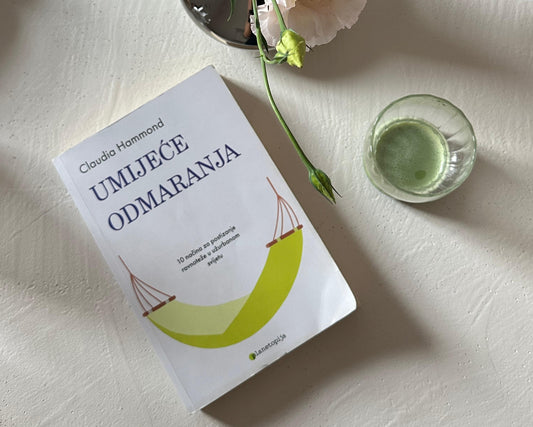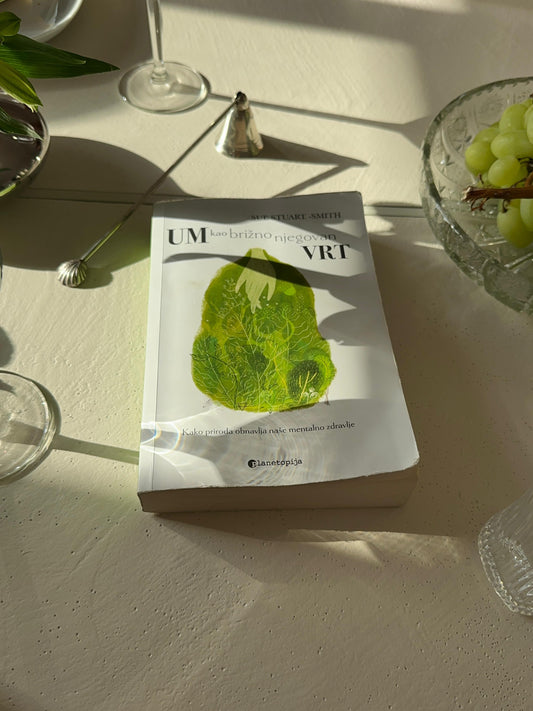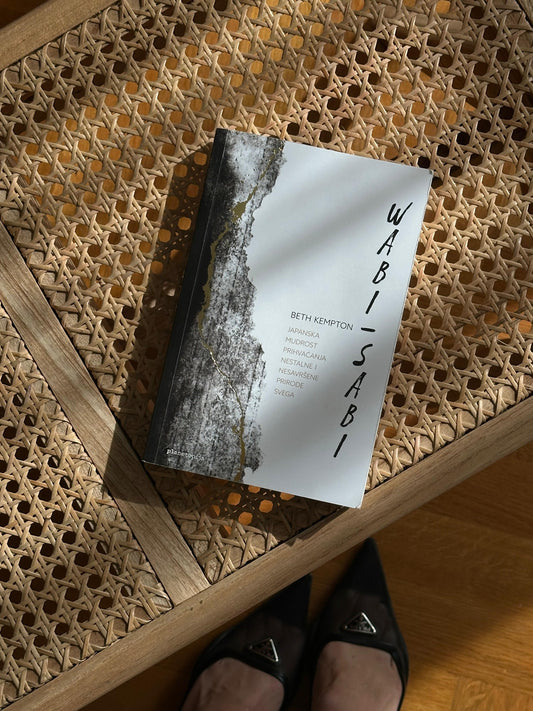Meditations: Learning to Live from Marcus Aurelius in a World that Constantly Tests Our Strength
The theme of November in the Materia Book Club was a book that seems unattainable to many -- Meditations [by Marcus Aurelius].
When I mentioned to a friend that I was reading this book, she laughed and said, "It's like taking Anatomy in Medicine as early as elementary school." And I admit, there's something to that. Not because Aurelius is difficult to read. On the contrary, his thoughts are incredibly simple, crystal clear. The topics he deals with -- calmness, death, morality, inner peace -- are the ones we still face today, despite the difference of two thousand years.
Aurelius' world is no less restless than ours. But, in his writing we recognize the wisdom that modern man often forgets. It is the ability to, amid all these changes and losses, turn to simplicity and inner peace.
Marcus Aurelius (April 26, 121 - March 17, 180) knew this and lived accordingly. Once a broken teenager raised by a single mother, he found salvation in Stoic philosophy. Then, as the last of the Five Good Emperors, he tried to save a dying world when he came to rule Rome.
Through the epochs, he still saves us with the strong foundation of his Stoic philosophy. At the Book Club, discussing the book, we realized how much it touches us. It asks us those oldest questions. How to find peace in a world where restlessness has become a constant shadow?

How much do we really control and how to deal with what we cannot control?
Marcus Aurelius, despite his power, was a man like us. He was prone to unrest and faced with loss. His thoughts, written as a personal diary, (he initially called the book Meditations To Himself) serve as a guide for those seeking serenity and stability in a world that often breaks us.
Life is fast-paced, and uncertainty often overwhelms us. This book is a priceless reminder. Inner peace and strength do not come from the outside.
The world we live in may have changed. But, the human quest for meaning and stability remains the same. As if, despite time, we are all still learning to be present in our own lives.
An Inner Compass Amidst the Storm
The book of Marcus Aurelius could be an inner compass for us. He did not write the Meditations as a great emperor or philosopher. He wrote as a man who is trying to survive a day in a world where chaos becomes the only constant.
We see, the world has not changed much in these 2000 years. Today that world bombards us with news, changes, and ideas. They tell us how we should look, behave, and think. But, despite important inner things, they are a constant. Aurelius' advice looks like pure simplicity and a return to the basics. But their application, like for him, is much harder in practice. That's why the Meditations serve.
In the book Meditations, Aurelius writes to himself, as we sometimes do. In moments when we need to establish some order in the disorder of thoughts. His most important advice? Turn to what you can control -- your inner life, your thoughts, your reactions.
In a world where all eyes are outwardly focused, he invites us to confront ourselves. There, where we are most often unprepared to dig, we need to find peace.

The Paralysis of Perfection and the Secret of Simplicity
Today, there is often an obsession with control -- from our own bodies to plans. Day by day, the idea is imposed that we must be the best version of ourselves.
When you read Meditations, you have to ask yourself - what if everything we are looking for is already there? What if the art of life is in accepting it, not in constantly trying to improve it?
Aurelius writes about accepting change as an integral part of life. When I look around, I clearly see that paradox - on the one hand, the resistance we have to change, and then the need for everything to always be even better, but the same.
Life, however, regardless of our expectations, is constantly changing. People come and go, situations develop and end, and we... we, in fact, are trying to maintain control over something that is by its nature elusive.
Facing Your Own Labels
We like to put people in frames, give them labels and definitions. Most often, we do the same to ourselves, in an attempt to understand who we are, where we belong.
We are all too complex, too changeable to be encompassed by one term, one label. Still, how often do we spend time putting people in frames, judging them through our own filters? Sometimes these frames are imposed, sometimes we choose them ourselves.
We must agree that we all need a reminder, other people and their actions are not important - what is important is our reaction to them.
People pass, but we stay in ourselves and with ourselves with our attitudes, with our souls.
That's why it's important that we address ourselves. As Aurelius points out, if we are good with ourselves - we don't need a break. We cannot escape from ourselves, not by the sea, not in the countryside, not in the mountains. If we are good with ourselves, then we are good in the chaos of transience.

The Paradox of Transience
How many times have we wished to hold onto a moment, knowing that everything changes? And how often do we ask ourselves if we are truly present?
It is precisely this paradox -- our longing for immortality amid a world of transience -- that is a recurring theme as we read Aurelius' thoughts. He writes about it as a kind of inevitable companion.
"Death is our friend," Rilke wrote in an extraordinary letter from 1923, "precisely because it brings us into absolute and passionate presence with all that is here, that is natural, that is love."
Death calls us to recognize the present moment, not to sleep through it. And, perhaps, the greatest challenge for each of us is just that -- to be present in life without too much effort to control it.
"Death, like birth, is a secret of Nature. The interchange of the elements, the one into the other, is a thing that should rouse no distress in you who have reason; for this is in accord with the processes and ordinances of Nature", writes Aurelius, adding:
"And consider this, too: You have lived in the world and seen God's purpose. You have done your service here. Let it be enough. Depart then, as he that employed you is gracious and kind. Depart then with a good courage and a quiet mind, as one who has truly served his time and taken his leave soberly and without regrets."

How often do we want things to remain unchanged? Yet, we worry about things that are not under our control.
Stoicism confronts us with the question -- what would happen if we just stopped? If we let life take its course. Without constant attempts to shape it according to our desires and expectations? Face that idea of passive acceptance. But, not giving up. Release the burden we have imposed on ourselves. Those are the expectations, control, and the need to always know what will happen. That sounds quite liberating.
To feel our own breath, to be aware of the moment in which we are. Instead of running forward, burdened by what might come or what might have happened in the past. Marcus Aurelius writes that that past and that future don't actually exist. There is only the present moment and only it we can influence.
Letting go of control as the key to inner peace
How many times have we felt anxiety about things that are not in our hands? Due to other people's actions, unpredictable outcomes, and situations outside our plans? Reading Meditations, we face the truth: if we learn to let go of control, we can find inner peace amid the stormiest moments.
Sometimes, in that unpredictability, we discover parts of ourselves that we didn't even know existed. We discover our ability to adapt, our strength and capacity for compassion.
How much hysteria do we sometimes bring into ourselves just to get closer to that apparent flawlessness?
At our Book Club we wondered how often we strive for a flawless life, without pain and imperfection, where everything is always the way we want it.
The discussion of Meditations reminded us that the illusions of flawlessness are everyday in our modern life. The real beauty of life, however, lies in imperfection. In the unpredictable moments that shape us, even when they are difficult or unfair.
Aurelius, a man who ruled an empire and deeply questioned his soul, through his thoughts and writings shows the way. One that leads to accepting life as it is, with a full heart and an open mind.
"Life is what your thoughts make of it", writes Aurelius. To himself, in different variations, he writes this statement which, 2000 years later, exists as, I would dare say, an absolute truth.

All the greatness of life is in simple presence.
Aurelius tells us about a life that is not freed from pain, fear, or insecurity, but about a life that accepts all that. In a world that constantly pushes us to run, maybe Stoicism brings us back to the most important: to be here and now. We must be present in the moment, peaceful in our imperfection, brave in facing the world as it is.
The violence we inflict on ourselves and others
I think about that unwillingness to allow people complexity. We constantly subject ourselves and others to subtle violence, trying to place them in our scheme of life. How much more visible is this today, when every gesture, every moment can be turned into a definition, posted on social networks, and categorized. And how many of us really, in the most intimate moments, suffer from that invisible violence that constantly seeks definitions and expectations.
Marcus Aurelius was a man who struggled with the idea of identity -- he was not just an emperor, he was not just a philosopher. He was a man. His Meditations are written from the desire to free himself from all the roles that were imposed on him, all the labels.
How often do we, ourselves, impose roles that constrain us, trying to meet other people's expectations? How free are we once we let go of those expectations and allow ourselves to be just what we are?
Stoicism as a Light in Times of Uncertainty
The truth is, no matter how hard we try, we cannot control the world. We can't control other people or situations either. We can, however, control ourselves. And there, in that space, lies the greatest freedom.
It may seem small, almost superfluous, but that control over ourselves, over our own thoughts and feelings, is the only thing we truly have.
As we read Aurelius' words - we felt peace -- as if those words speaking from ancient times were clairvoyant and knew how much meaning and comfort they would have today.
We don't need anything more than ourselves to be ourselves. Maintain control over what is within us. We need to let go of everything external. Move away from other people's expectations, labels, and pressures. And especially from our own, strict rules and principles towards ourselves.
When we leave, we look forward to the next meeting. We carry, at least for a moment, the evening, the day, the most important thoughts: be calm in the midst of chaos, be present in the present moment, and be free in your imperfection. Until we forget all that the next morning and again seek strength in ourselves to remember who we are and what matters. Again and again.











